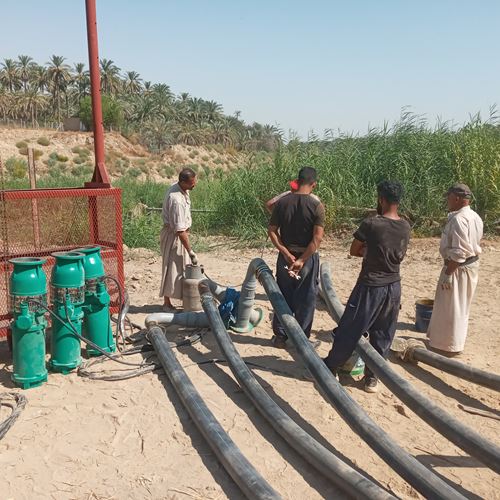
Climate change, water shortages, and the vital role of extending essential services
Iraq, highly water-scarce, confronts severe challenges from limited resources, intense heat, and escalating desertification. Residents in informal settlements, already enduring poor conditions, bear the brunt of climate change. Providing essential services like WASH and waste management can restore safety and dignity to these vulnerable communities.

Iraq experiences extreme water scarcity due to a number of factors that include poor infrastructure, increased temperatures, severe and prolonged droughts and ongoing hydropower projects conducted upstream by Turkey and Iran.
Water levels in the Euphrates and Tigris rivers, which start in Turkey and run through Syria before reaching Iraq, have significantly decreased in recent years. Dire warnings about the impact of climate change have been issued in recent years, including from Iraq’s Ministry of Water Resources, who predicted that unless urgent action is taken, Iraq’s two main rivers will be dry by 2040.
An estimated 100,000 people continue to reside in informal sites across Iraq where they are both physically and socially marginalised from society. These people live in extremely adverse conditions and are some of the communities most exposed to the impact of climate change and water scarcity.
These sites are a last resort for people who are unable to return home due to a myriad of unresolved security, safety and social cohesion concerns combined with a range of economic and administrative barriers. Informal settlements are home to some of the most vulnerable populations in Iraq, included female-headed households and persons with disabilities.
The living conditions in informal settlements deny people safety and dignity. Deficiencies in water, sanitation, and hygiene (WASH) services put people at unnecessary risk and exacerbate the chance of disease and ill-health. A lack of sufficient infrastructure such as water and waste management cause people to develop a range of negative coping mechanisms.
For many, this involves rationing even the most basic needs for survival such as water.
People DRC works with explain that they are forced to use their minimal income to buy water from stores at high costs or to hire cars to drive to water distribution points.
Not only does this impact families financially, who then must go without other necessities, it also increases social tension. As water scarcity is pervasive through much of Iraq, IDPs often encounter issues when collecting water from neighbouring communities who fear sharing their limited water resources will leave them unable to meet their needs.
Moreover, many shelters urgently need upgrades for sufficient security and adequate protection from the increasingly harsh weather conditions which see cold winters and intensely hot, long and dry summers. Access to necessities also remain a pressing concern, with many households lacking essential items and facing acute financial difficulty as a lack of civil documentation denies people access to social security nets and prevents their freedom of movement.
Additionally, in the absence of adequate waste management infrastructure, communities frequently struggle with the challenge of finding safe and hygienic solutions. In sites where DRC has operated, this dilemma often leads to highly unsanitary conditions. Waste is often piled or scattered nearby to people’s shelters or burnt in close proximity to living areas. The issue is exacerbated by insufficient hygiene education and a lack of access to basic hygiene products.
People living in these environments have told DRC that these issues directly impact their physical and mental health. Communities often suffer from preventable ill-health such as diarrhoea and skin disease and recount feelings of shame and ostracization as they are forced to live in substandard and unhygienic conditions that they know other communities are not subjected to.
Funded by USAID's Bureau for Humanitarian Assistance (BHA), DRC interventions to extend water and waste management services, combined with distributing hygiene kits and delivering hygiene awareness sessions, have had an immediate and significant impact on the health and wellbeing of communities.
Access to adequate water ensures people are able to drink, cook and wash without unnecessary limitations and has reportedly reduced the number of cases of diarrhoea and skin disease. A safe and dignified way to deal manage waste has restored a sense of dignity to communities.
The continuation of humanitarian assistance is essential in order to meet the most basic needs of these marginalised communities, whilst investments in shelter and sanitation infrastructure are essential to safeguarding the health and dignity of displaced populations.
Sustained engagement and collaboration among humanitarian actors, governments, and the international community are imperative to navigating the complexities of protection and assistance in Iraq's informal settlements and fostering sustainable pathways to durable solutions for displaced communities.
With support from
This media product is made possible by the generous support of the American people through the United States Agency for International Development (USAID). The contents are the responsibility of DRC and do not necessarily reflect the views of USAID or the United States Government.
